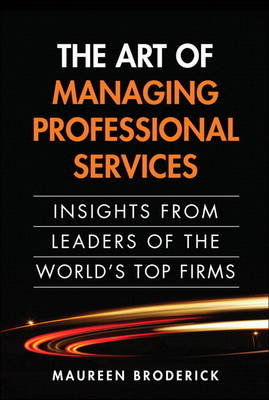
The Art of Managing Professional Services
Financial Times Prentice Hall (Verlag)
978-0-13-704252-4 (ISBN)
- Titel ist leider vergriffen;
keine Neuauflage - Artikel merken
Broderick has brought together modern best practices for these and other crucial areas of professional services management:
· Building, communicating, and maintaining shared vision, values, and culture
· Recruiting, training, and evaluating people
· Crafting the right strategies, portfolio, and mix of clients
· Innovating and sharing knowledge
· Financial planning, metrics, and reporting
· Positioning: brand, marketing, and sales
· Defining effective partnerships: equity, selection, and compensation
· Ensuring responsibility and accountability
· Organizational design, structure, governance, and systems
· Leading effectively, and growing the next generation of leaders
This book reflects Broderick & Co.'s unparalleled research into professional services management, including 200+ executive interviews with leaders and innovators in organizations of all sizes and types.
Maureen Broderick is founder and CEO of Broderick & Company, one of the few consulting firms that focus exclusively on professional services. Broderick & Company provides strategy, research, and thought leadership services to many of the world’s leading firms. Before founding Broderick & Company in 1996, Maureen spent close to 20 years working in-house for industry leaders ranging from Price Waterhouse and Booz Allen Hamilton to the law firm Brobeck, Phleger & Harrison and the research institute SRI International.
Foreword by Jay Lorsch xv
Acknowledgments xvii
About the Author xxi
Introduction 1
Chapter 1: Professional Services 9
Characteristics, challenges, and leadership model
Common Characteristics of Successful Firms 10
It’s Not All Good News 13
The Broderick PSF Leadership Model 14
Chapter 2: Shared Vision, Values, and Culture 17
Building, communicating, and maintaining
Five Essentials of Vision, Values, and Culture 20
Embedding Values and Culture 22
The Reinforcement of Values and Culture Begins with Recruiting 23
Telling the Firm’s Story Reinforces the Culture 24
Teams Teach You How to Live and Work in the Firm 24
Constant Communication Is Critical 25
Celebrate and Reward Good Behavior 28
Making Values Stick 28
Revitalizing Vision, Values, and Culture 31
Chapter Summary 38
Chapter 3: People 39
Recruitment, training, and evaluation
Seven Essentials of Talent Management 41
Recruiting: Refreshing the Ranks 43
Interviewing and Selection: Choosing the Best Candidates 46
Mapping a Career Path 47
Training: Fostering Connectedness and Commitment 51
Mentoring: Providing Personal and Professional Support 55
Performance Evaluations: Frequent and Thorough Feedback 60
Diversity Looms Large–and Will Continue to Pose a Major Challenge 62
Chapter Summary 63
Chapter 4: Portfolio 65
Strategy, client mix, and relationship management
Five Essentials of Client Portfolio Management 67
Mastering the Client Management Life Cycle 69
Step One: Strategically Plan and Review the Client Portfolio 70
Step Two: Onboard New Clients 75
Step Three: Sustain and Grow Accounts 76
Step Four: Solicit Client Feedback 88
Step Five: Review and Measure Results 91
Chapter Summary 94
Chapter 5: Services 95
Strategy, innovation, and knowledge sharing
Four Essentials of Successful Service Portfolio Management 97
Follow the Service Strategy Cycle 98
Step One: Review the Service Portfolio 99
Step Two: Stimulate and Capture New Ideas 102
Steps Three and Four: Select the Best Ideas, and Take Them to Market 108
Step Five: Share Knowledge 111
Four Essentials of Knowledge Management 112
Chaper Summary 119
Chapter 6: Finance 121
Planning, metrics, and reporting
How Do the Top Firms Manage Finance? 123
Financial Planning and Budgeting 124
Forecasting 126
Metrics to Monitor the Business 127
Revenue 129
Profitability 130
Utilization 131
Pricing 132
Leverage 136
Performance Efficiency 137
Early Warning Signs 138
Reporting 139
Transparency and Accountability 142
Chapter Summary 146
Chapter 7: Positioning 147
Brand, marketing, and sales
Five Elements of a Successful Market Strategy 149
The Power of Brand 151
Determine the Market and Brand Positioning 151
Embed and Build the Brand 155
Keep the Message Clear and Consistent 160
Regularly Test Brand Strength 160
Marketing 161
Sales 162
Building a Marketing and Business Development Plan 164
Firm-wide Brand Initiatives 164
Business Unit Plans 166
Master Plan, Timeline and Budget, Tracking and Measurement 167
Thought Leadership: The Most Powerful Way to Grow the Business 170
The Role of the Marketing Professional 175
Areas of Focus for the Marketing Department 177
Chapter Summary 182
Chapter 8: Partnership 183
Equity, selection, and compensation
Six Characteristics of Enduring Partnerships 184
Selecting an Ownership Structure 186
Advantages and Disadvantages of Ownership Structures 187
Public Versus Private 192
To Sell or Not to Sell 195
Equity Programs to Attract and Retain the Best 197
Rewarding the Partners: Dividing the Pie 203
Distribution Models 203
Evaluating Performance 205
Partnership Performance Criteria 208
Partnership Selection: A Pivotal Decision 211
Criteria for Promotion to Partnership 212
Partner Promotion Process 213
Chapter Summary 216
Chapter 9: Strategy 219
Process, responsibility, and accountability
Why Strategic Planning Matters 221
Five Essentials for Successful Strategic Planning 223
Orchestrating the Planning Process 226
Long-Term Planning 227
Annual Planning 231
Review, Monitor, and Update 232
Accountability 234
Chapter Summary 236
Chapter 10: Structure 237
Design, governance, and style
Why Getting It Right Is So Challenging 239
Seven Essentials for a Successful Infrastructure and Governance Model 240
Organizational Structure: The Scaffolding That Supports the Firm 243
Board of Directors: Composition and Selection 244
Chairman: Selection and Role 247
CEO: Selection, Role, and Succession 248
Management Committee: Composition and Selection 253
Business Units: Structure and Seat of Power 254
Other Functions/Special Initiatives 257
Administrative Support 257
Changing the Structure 258
Governance Style 259
Chapter Summary 263
Chapter 11: Style of Leadership 265
Characteristics, grooming, and advice
Essential Characteristics of a Successful Leader: Emotional Intelligence and People Skills 267
Good Influencer/Builder of Coalitions 268
Inspirational and Passionate 268
Visionary 268
Good Listener 269
Good Communicator 271
Understands the Business 274
To Bill or Not to Bill 274
Grooming a Global Leadership Corps: Finding and Nurturing Future Leaders 278
Some Parting Advice for Leaders 284
Author’s Note 286
Index 287
Lessons from Leaders
Chapter 2: Shared Vision, Values, and Culture
Teaming at Cravath 26
Booz Allen Hamilton Core Values 29
Edelman Revisits Vision and Values 32
Korn/Ferry Changes Its Vision and Culture 34
Chapter 3: People
Recruiting at ghSMART 48
Career Development at Booz Allen Hamilton 50
Latham & Watkins Multistage Career Training 53
Training at Bain & Company 56
Plante & Moran’s Team-Based Mentoring 59
Chapter 4: Portfolio
Grant Thornton Client Experience Program 77
Black & Veatch Client Portfolio Mix 81
Account Management at Burson-Marsteller 83
Client Management at Ernst & Young 87
Edelman’s Client Feedback Program 90
Chapter 5: Services
Deloitte Australia’s Innovation Program 104
CSC’s Office of Innovation 107
Knowledge Management at Grant Thornton 116
Chapter 6: Finance
Black & Veatch Forecasting Process 128
Metric Management at Gensler 141
ghSMART’s Budget, Dashboard, and Review Process 144
Chapter 7: Positioning
Brand Management at Skadden, Arps 156
Euro RSCG Life Culture Scan 158
Growing an Industry Program at Ernst & Young 168
Thought Leadership at Booz & Company 174
Chapter 8: Partnership
Slater & Gordon Becomes the First Law Firm to Go Public 193
The Acquisition Process at Baker Robbins & Company 196
Gensler’s Principal Evaluation Process 207
Compensation Criteria at Eversheds 210
Making Partner at Egon Zehnder International 215
Chapter 9: Strategy
Planning at Peppercom 225
Hewitt’s Planning Process 229
Annual Planning at Ernst & Young 233
Chapter 10: Structure
Clifford Chance Offshoring Program 242
Election Process at Skadden, Arps 250
A.T. Kearney Revamps Structure and Governance 261
Chapter 11: Style of Leadership
Ogilvy Public Relations Worldwide: Leading Growth 270
KPMG: Leading Through a Crisis 272
Clifford Chance: Leading Through Transition 275
Cultivating Leadership at O’Melveny & Myers 281
Emerging Leaders Program at Dewberry 283
| Erscheint lt. Verlag | 24.3.2011 |
|---|---|
| Verlagsort | Upper Saddle River |
| Sprache | englisch |
| Maße | 235 x 163 mm |
| Gewicht | 564 g |
| Themenwelt | Wirtschaft ► Betriebswirtschaft / Management ► Unternehmensführung / Management |
| ISBN-10 | 0-13-704252-3 / 0137042523 |
| ISBN-13 | 978-0-13-704252-4 / 9780137042524 |
| Zustand | Neuware |
| Haben Sie eine Frage zum Produkt? |
aus dem Bereich


